The secret life of Gracie Blangy: Queen Mum's classmate
Gracie Blangy celebrated her 102nd birthday on 9 October with a letter of congratulations from her former classmate’s daughter the Queen. Care home workers cut cake and Gracie posed for snaps. But who was Gracie Blangy?
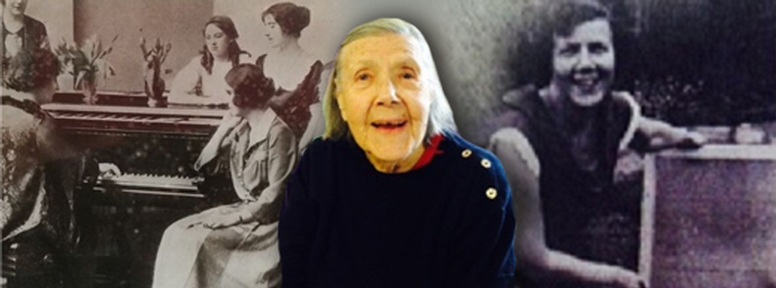
If the sum of a person’s life can be calculated by the figures they play, the many parts of Gracie should be taken note of.
Given a boy’s name at birth just months before the first world war, (Oliver in case you’re wondering) and given up for adoption as a toddler, she has been described as a shy, reserved lady and a woman of considerable talents.
Gracie was a concert pianist taught at the same music college by the teacher instructing Lady Elizabeth Bowes-Lyon - more affectionately known as the Queen Mum.
The future wife of King George VI was a lot older than her and so their paths only crossed at the Children's College of Music.
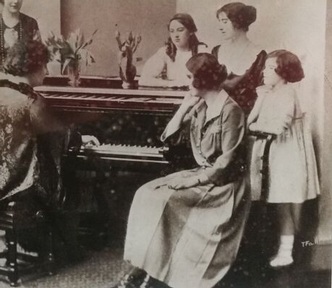
From childhood, Gracie’s life seemed to be music. Her father was a lead violinist in a national orchestra and her mother was a music teacher. Learning to play the piano and violin, she spent much of her time with the late Queen Mum's teacher Miss Adela Verne.
Young Gracie played with symphony orchestras even when she was too small to reach the pedals. While playing with an orchestra conducted by Sir Henry Wood, she stopped the orchestra in full flow on three occasions to ask for assistance to reattach wooden rods that had been specially bolted to her piano’s pedals, so that she could reach them.
After some furtive but fruitless attempts at DIY by an assistant who scuttled on stage thrice to reattach the rods, the conductor insisted the show must go on and told little Gracie to manage rods or no rods.
Music and life with her parents seemed to be all Gracie had known during her formative years. The news that she had been adopted was somewhat shattering to her, as she was only told when she was 21 years old. Many years later, she said she was not interested in knowing who her birth parents were and has no memory of her time with them.
Not long after, Gracie married her childhood sweetheart. When war broke out, her husband was posted by the army to Scotland.

When Gracie was called up for the war effort, she politely refused work in a munitions factory because “it would wreak havoc” on her concert pianist hands.
As a result, she was sent to work in the ‘Code and Cipher’ department in London’s Admiralty Arch throughout the Blitz.

With Britain’s finest code breakers at Bletchley Park, Gracie’s department was nothing short of an enigma to her.
Gracie said she was passed information by senior people from another department, which she fed into a machine that looked like an old shop till.
She punched in letters and numbers and what came out the other end was passed onto another department.
Years later she told her step daughter it was: “Gobbledegook”.
“We didn’t know what it meant and it didn’t mean anything to me at all.”
Of her work in Churchill’s Code and Cipher department she said: “It was immensely boring".
Time spent in Admiralty Arch during the Blitz, may have struck fear for many seeing Hitler’s Luftwaffe over London’s skies.
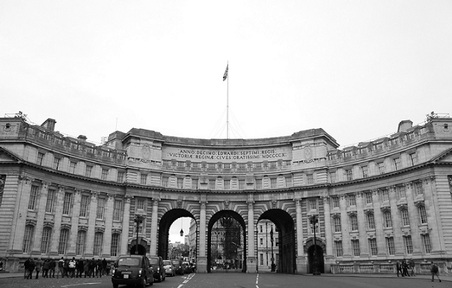
But there proved to be an enemy lurking from within the building that she had to battle on a daily basis. “It was absolutely ghastly”, she recalls.
Seven floors down from the arch, she remembers how the place was overrun with cockroaches.
Boring and ghastly it may have been but Gracie was committed to her work and while rushing to work, she slipped and damaged her coccyx, an incident that caused her problems for much of her life.
Despite repeated requests from her husband in Scotland for her to go and join him, Gracie stayed in London. Her husband later remarried and emigrated to South Africa in the late 1940s.
Meanwhile Gracie’s piano skills gained a regular audience on the BBC’s radio broadcasts, which aired news bulletins to those at home and abroad during the war.
Though Gracie had loved playing the piano, she never played again after these broadcasts.
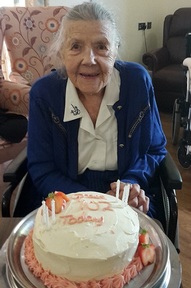
"I can’t tell you why I began to lose my nerve” she told her stepdaughter who believes it has something to do with teatime requests from her parents to ‘play again’ for visiting guests. It might also have had something to do with the rheumatism affecting her hands in the 1980s.
Gracie met and married an admirer who spent his war years in the RAF on air sea rescue missions. After 1947, they moved to Brighton.
Gaining a new stepdaughter as well as husband, Gracie treated her as her own. She and her husband spent 40 years together.
When her husband died, many people tried to persuade Gracie to move into a care home because she was struggling on her own, but Gracie was adamant she wouldn’t move from their home.
She remained in their flat until she fell in 2013 and was only discovered the next day after police forced entry when she didn’t answer. She had been on the floor of her bathroom unable to get up. She suffered a bang to the head.
After a period in hospital Gracie came to St Mary’s Court care home in Braintree, Essex. Staff at St Mary’s Court remember fondly the time she first arrived. Upon hearing about her skills as a concert pianist, a care worker led her to the home’s piano.
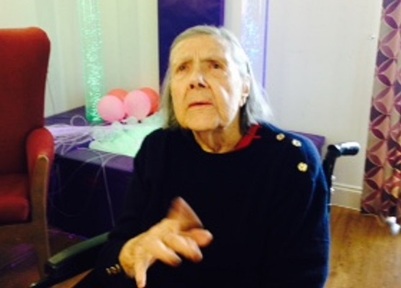
“She took one look at the piano and said: ‘there’s only one thing that’s good for. Firewood.”
Grace by name, grace by nature until she got dementia. The signs began to emerge six years ago, when the lady whose stepdaughter described her as “always gracious” started being ‘stroppy’ to staff and loved ones.
Her stepdaughter Pauline said: “When my husband did accounts for her she would throw things across the room at him and although I was shocked and couldn’t understand it, he would tell me something was not quite right ‘up top’.”
With a chance to meet Grace, I travelled to St Mary’s Court care home. A well-groomed head of silvery hair framed the face of a lady who looked too young to claim her many years. It was her smile that first caught my eye.
When asked how she felt about being in the care home she said: “I pay a lot of money to stay in this hotel.”
When entertainers perform at the care home, staff tell me Gracie is keen to critique them. While listening carefully to one organ player, she told a care worker “he’s not doing half bad”.
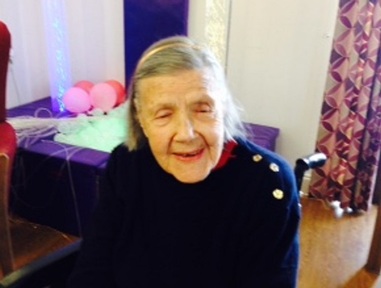
Gracie’s eyes shifted to the mid-distance at times or darted to the walls as she fought hard to remember the names of those she had known.
She was effusive at times, reeling out lengthy statements about characters: “He was another one, bit naughty. He was a darling.” When I asked her who she meant, she replied “Prince Philip” and continued her summation of his character before saying his name was Cecil.
At other times, Gracie's eyes looked directly at me and were concentrated in their gaze.
At one point she said: “I’d like a lively life if I could have it. “I’d like a house, friends, things I like.”
She spread out her long crepe paper-like hands to show me the digits that had bewitched many an audience and said “Not bad”.
As I got up to leave and said my goodbyes, she flashed her smile at me again and said: “Hope to see you again soon”.
I do not know Gracie’s secret to a long life but her own words “On the whole, be nice to people” is indeed a worthy motto to live by.
Latest Features News
 25-Nov-19
2019 Election: Boris Johnson leaves social care in 'too difficult box' but Labour vows to end 'crisis'
25-Nov-19
2019 Election: Boris Johnson leaves social care in 'too difficult box' but Labour vows to end 'crisis'
 18-Oct-19
Podcast: Wendy Mitchell and dementia: 'My biggest fear is not knowing who my daughters are'
18-Oct-19
Podcast: Wendy Mitchell and dementia: 'My biggest fear is not knowing who my daughters are'
 27-Sep-19
Exclusive: Care minister backs care workers' call for time off to grieve and attend funerals
27-Sep-19
Exclusive: Care minister backs care workers' call for time off to grieve and attend funerals
 19-Sep-19
Podcast: Gyles Brandreth says poetry helps ward off dementia
19-Sep-19
Podcast: Gyles Brandreth says poetry helps ward off dementia
 30-Aug-19
Edinburgh Fringe funnyman joins comics facing toughest audience at care home gig
30-Aug-19
Edinburgh Fringe funnyman joins comics facing toughest audience at care home gig